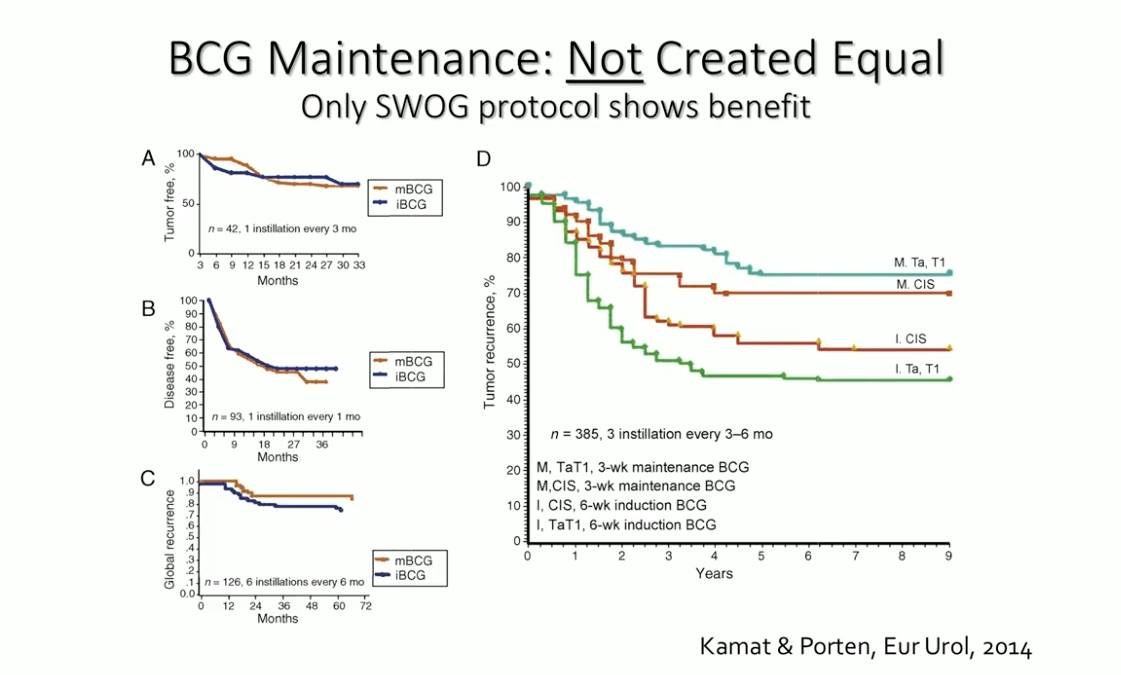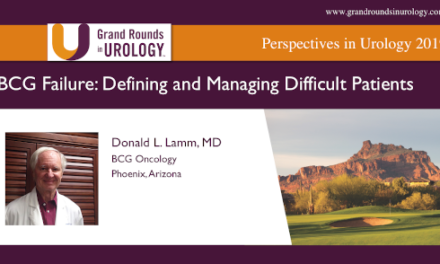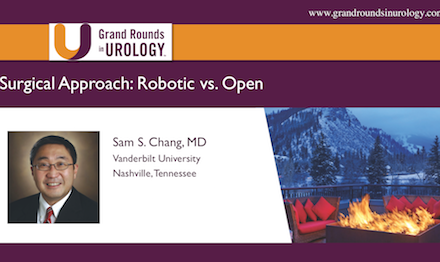Michael S. Cookson, MD, MMHC, presented “BCG Maintenance Should Be Less Intense” during the 27th Annual Perspectives in Urology: Point Counterpoint on November 9, 2018 in Scottsdale, Arizona.
How to cite: Cookson, Michael S. “BCG Maintenance Should Be Less Intense” November 9, 2018. Accessed May 2025. https://grandroundsinurology.com/bcg-maintenance-should-be-less-intense-2/
BCG Maintenance Should Be Less Intense – Summary:
Michael S. Cookson, MD, MMHC, suggests that the primary evidence does not provide convincing evidence in favor of 3 years of bacillus Calmette-Guérin (BCG) maintenance for non-muscle-invasive bladder cancer (NMIBC). He also notes that long-term BCG often leads to toxicities, contributing to low patient compliance.
Abstract:
BCG has been the standard of care for high-risk NMIBC since 1976. Currently, most guidelines recommend BCG maintenance for 1-3 years. However, there are limitations to the evidence behind these guidelines, necessitating need for a reassessment of the use of maintenance.
Indirect comparisons from meta-analyses provide the basis for most recommendations for BCG maintenance. Furthermore, many randomized controlled trials (RCTs) found no direct evidence of benefit at all. These RCTs that looked at BCG maintenance also had serious limitations. They were mostly underpowered, lacked quality individual patient data with long-term follow-up, did not use enhanced imaging with blue-light cytoscopy or narrow-band imaging, and included patients who had experienced wide variations in the quality of transurethral resection. Similarly, these trials did not record important data, such as which patients received BCG retreatment for relapse after induction.
Of the 7 RCTs which compared induction BCG plus maintenance to induction alone, only 2 studies found significant differences in favor of maintenance. The SWOG (originally known as Southwest Oncology Group) maintenance study showed a reduction in disease progression with maintenance. However, the study defined progression as worsening-free survival, a broad, composite endpoint.
Though not underpowered, this study featured many of the same issues as other BCG maintenance RCTs, and its methodology was not statistically sound.
Long-term BCG maintenance leads to risk of toxicity and non-compliance. Around 50% of patients treated with BCG complain of side effects and. This toxicity then contributes to low compliance, as few patients complete the full recommended three years of maintenance. The optimal length of BCG maintenance remains unknown, but arguably, guidelines should recommend less intense treatment.
About Perspectives in Urology: Point Counterpoint
Perspectives in Urology: Point Counterpoint (PCP) is an annual CME-accredited conference devoted to discussing and debating the latest topics in men’s health, general urology, and genitourinary cancers. The conference’s format includes more than didactic lectures. It also includes debates, point-counterpoint discussion panels, and unique case-based presentations. Dr. Cookson presented this lecture during the 27th PCP in 2018. Please visit this page in order to register for future PCP meetings.
ABOUT THE AUTHOR
Michael S. Cookson, MD, MMHC, is Professor and Chairman of the Department of Urology and holds the Donald D. Albers Endowed Chair in Urology at the University of Oklahoma Health Sciences Center in Oklahoma City. He has authored some 240 peer-reviewed journal publications as well as more than 30 chapters of various textbooks, and he is nationally recognized for his outstanding contributions to urologic oncology. Dr. Cookson completed his Urology Residency at the University of Texas, San Antonio, and completed his Urologic Oncology Fellowship at Memorial Sloan-Kettering Cancer Center in New York. From 1998 to 2013, he served as the Vice Chairman of Urologic Surgery and Director of the Urologic Oncology Fellowship Program at Vanderbilt University. Dr. Cookson has devoted much of his academic career to the management of patients with urologic cancers, with a strong emphasis on clinical guidelines, education, and evidenced-based medicine. He was a member of the AUA/ABU Examination Committee for 10 years, serving as Oncology Consultant and Pathology Editor. He also serves on the ABU Oral Examination Committee. He is a Co-Founder of the Oncology Knowledge Assessment Test (OKAT), an SUO-mandated examination. He also served as Chair for the OKAT for 5 years. In 2011, he received the President’s Distinguished Service Award from the SUO for educational contributions. He received the 2018 AUA Presidential Citation for Outstanding Service for his role in the development of the OKAT and as Chair of the Castration-Resistant Prostate Cancer Guidelines Committee at the AUA 2018 Annual Meeting. Dr. Cookson has previously served as a member of the AUA Guidelines on Localized Prostate Cancer Committee. Dr. Cookson is currently serving out the 2019-2020 term as the SUO President.





